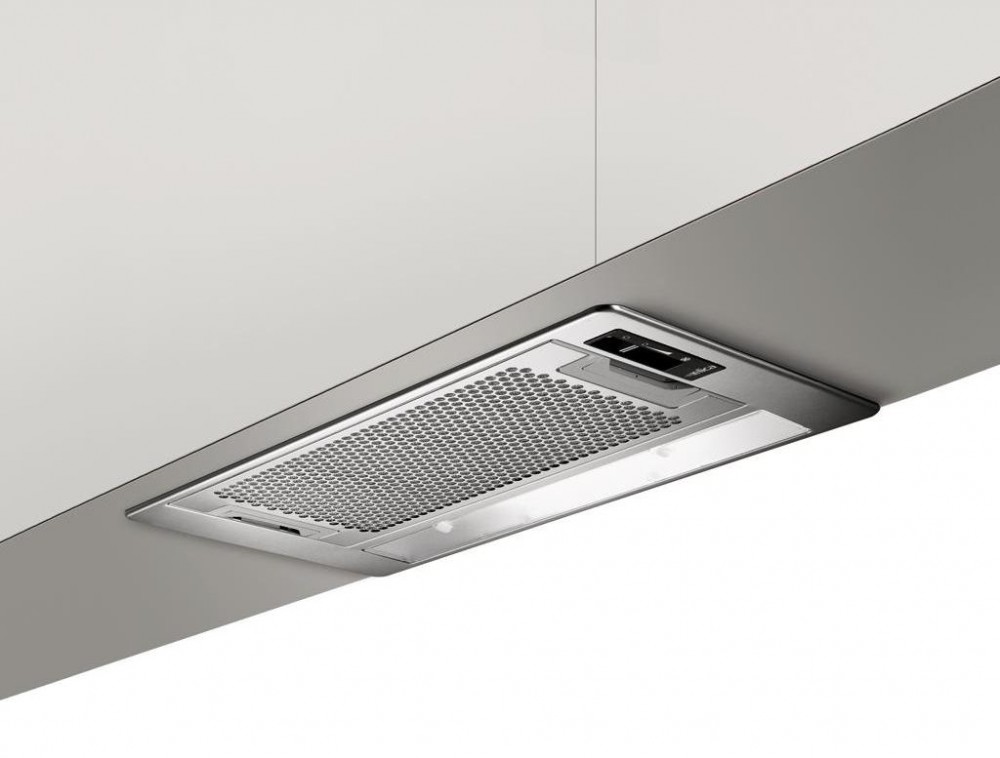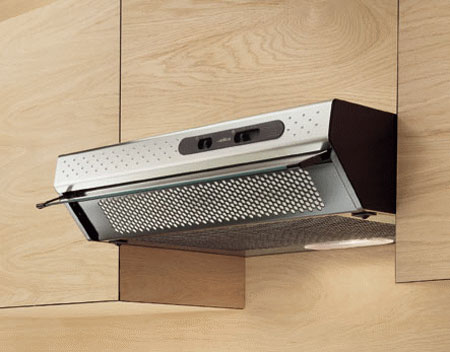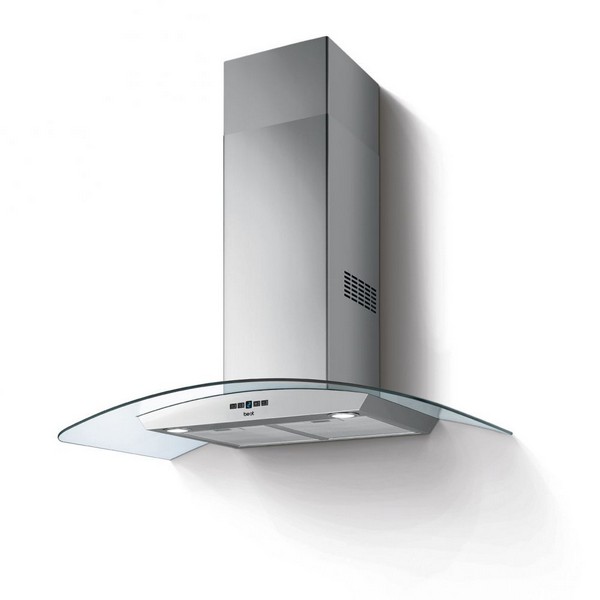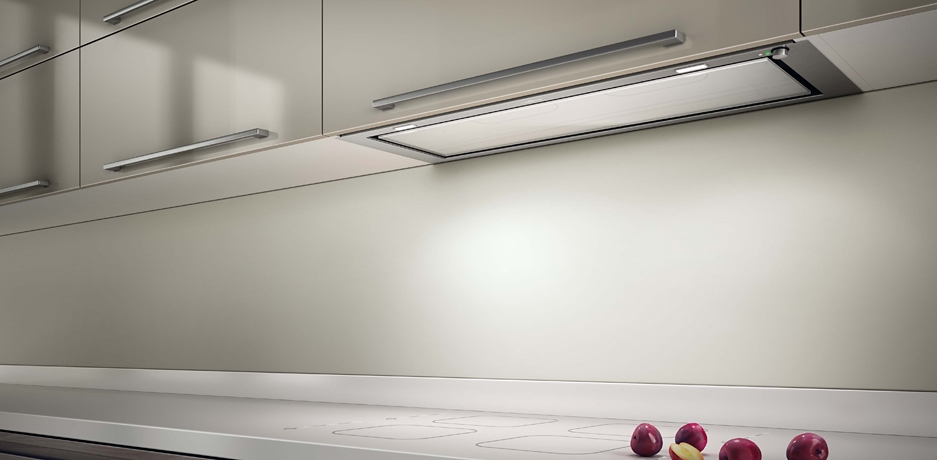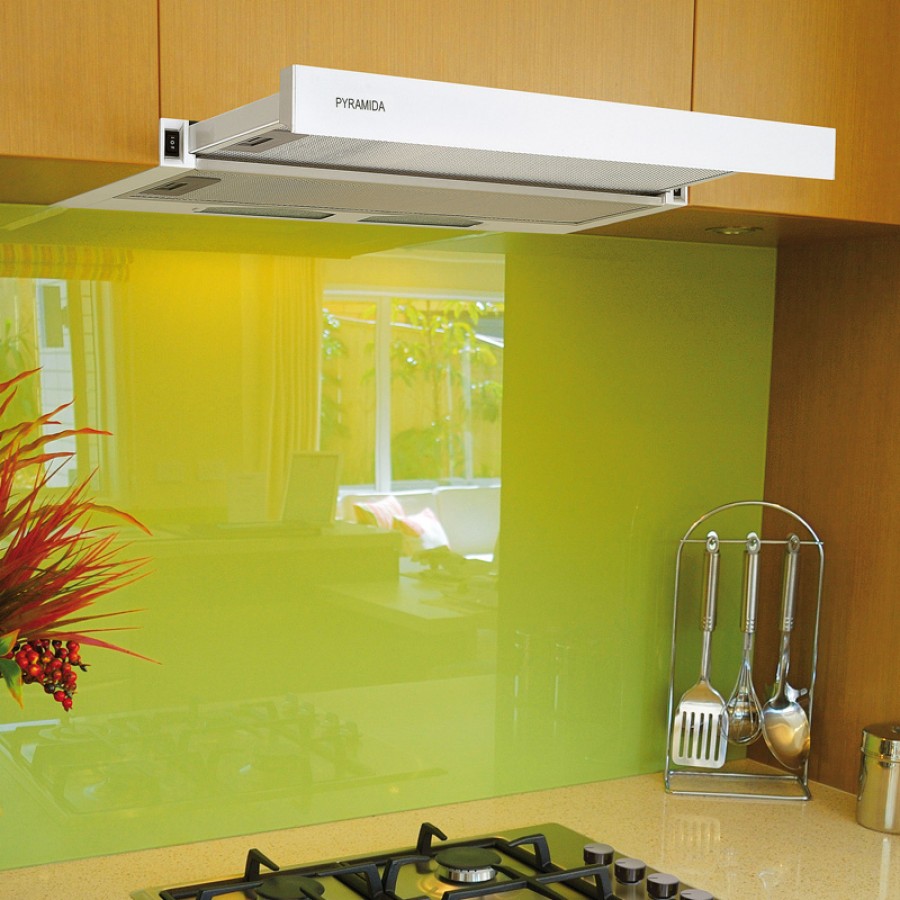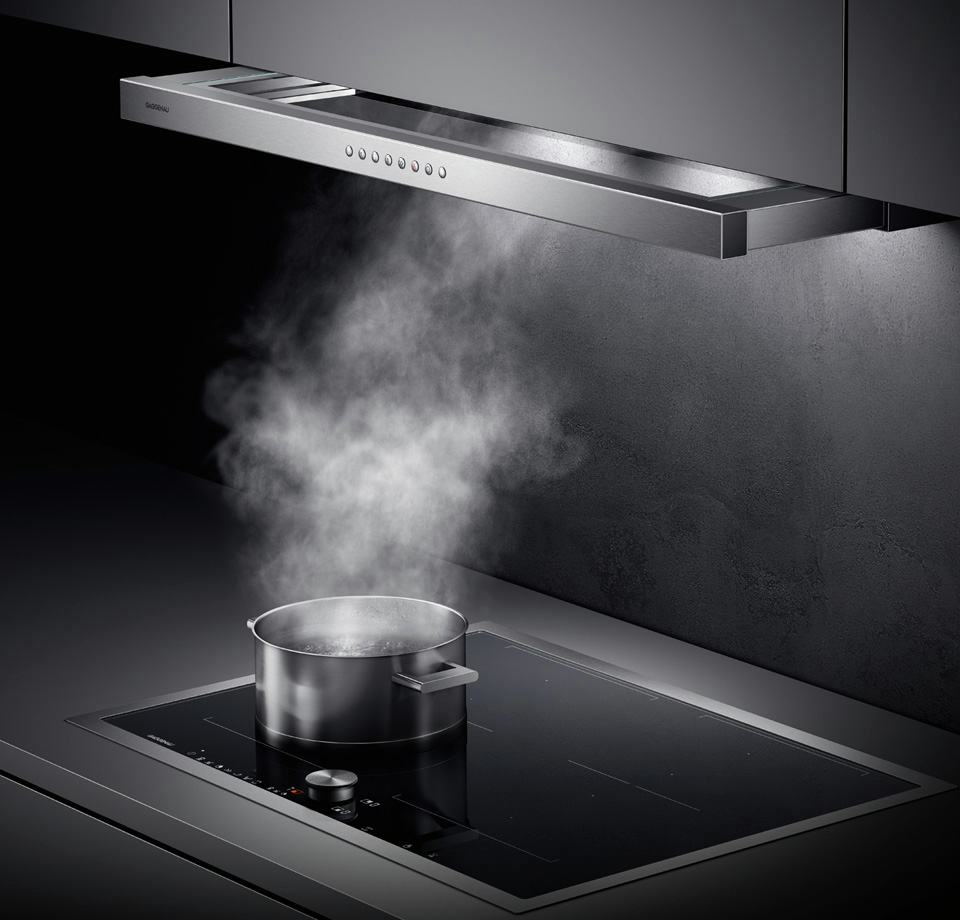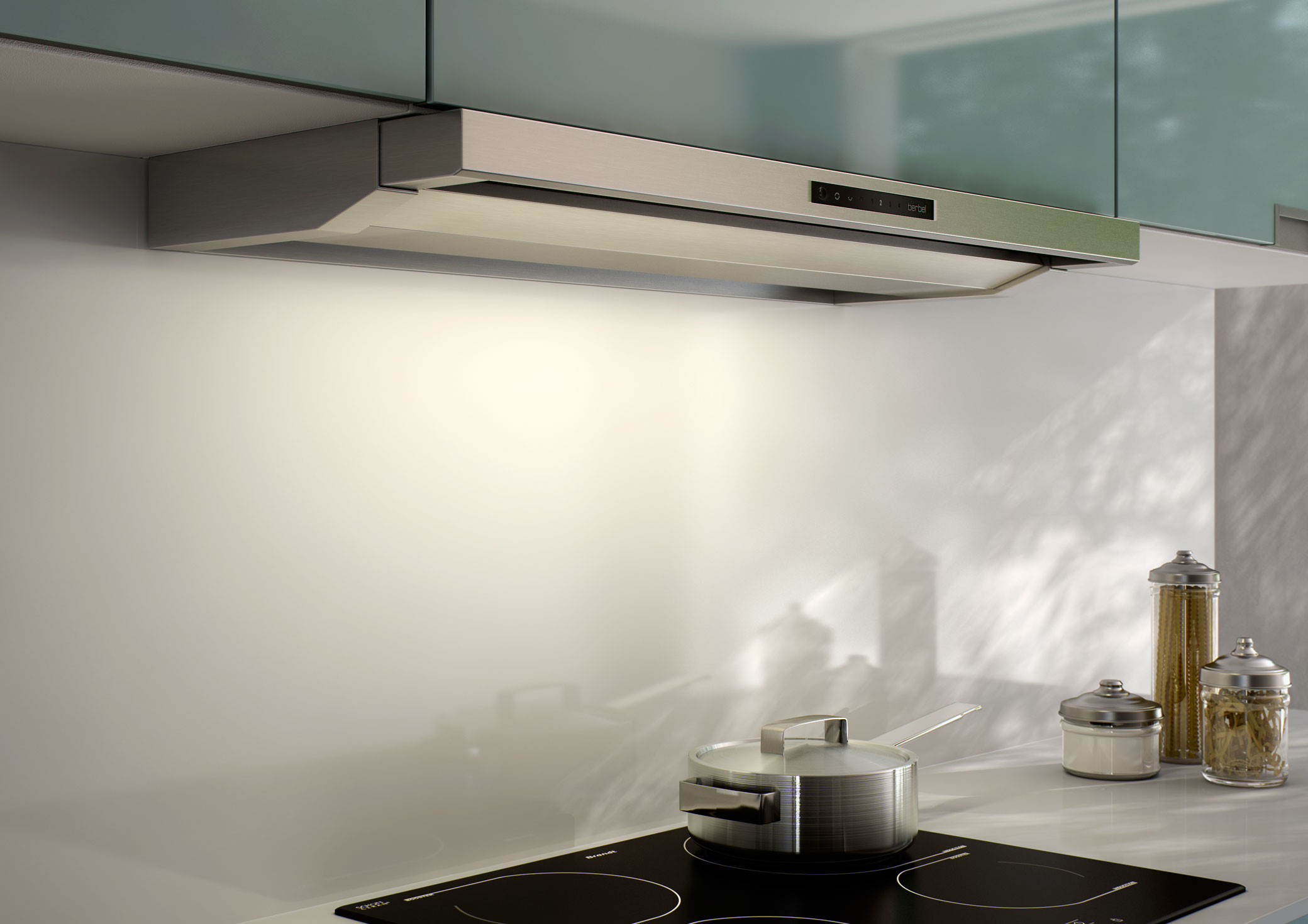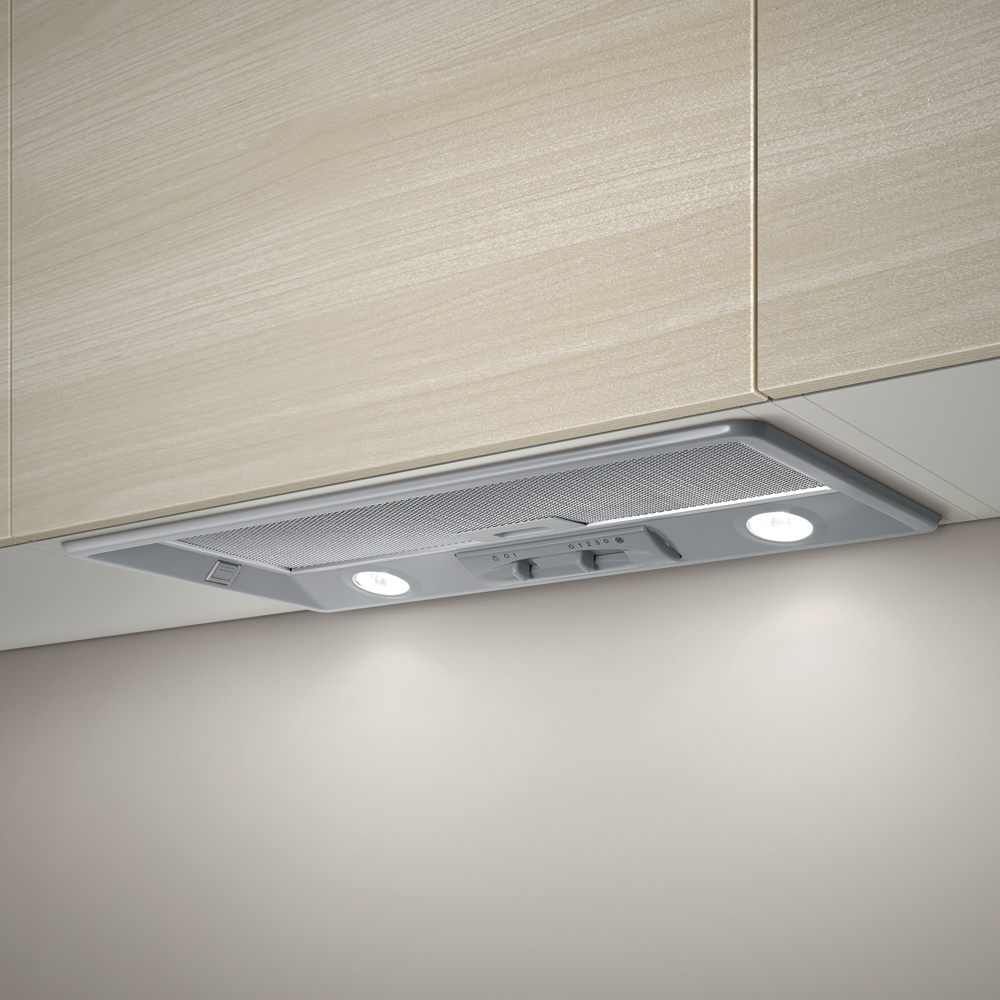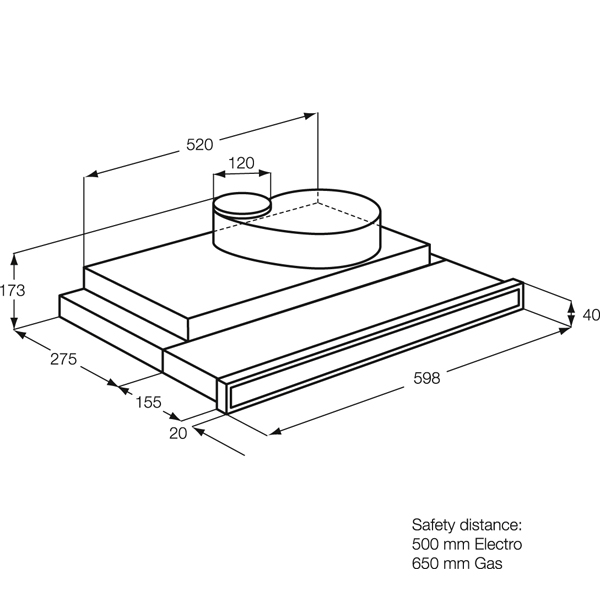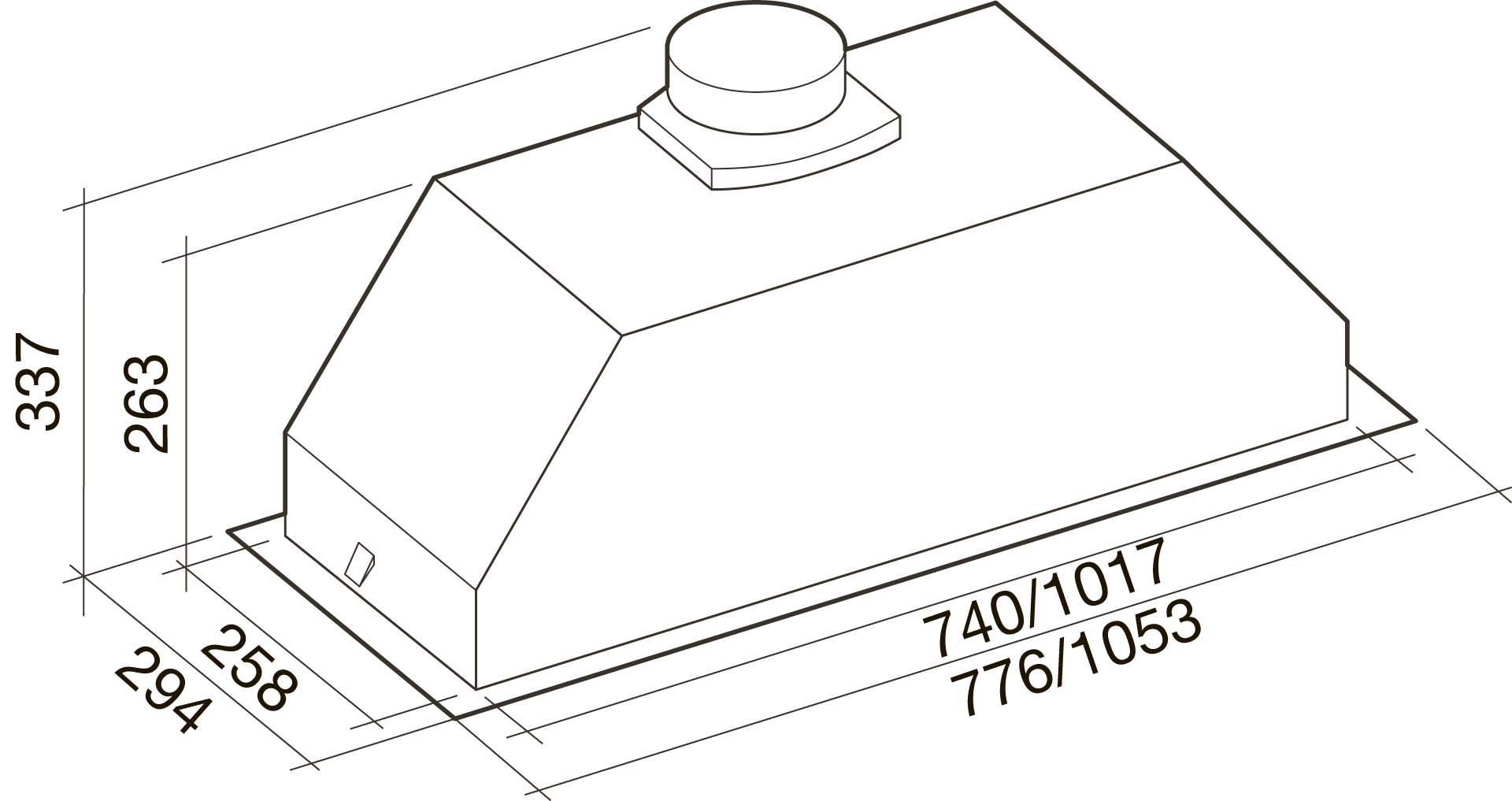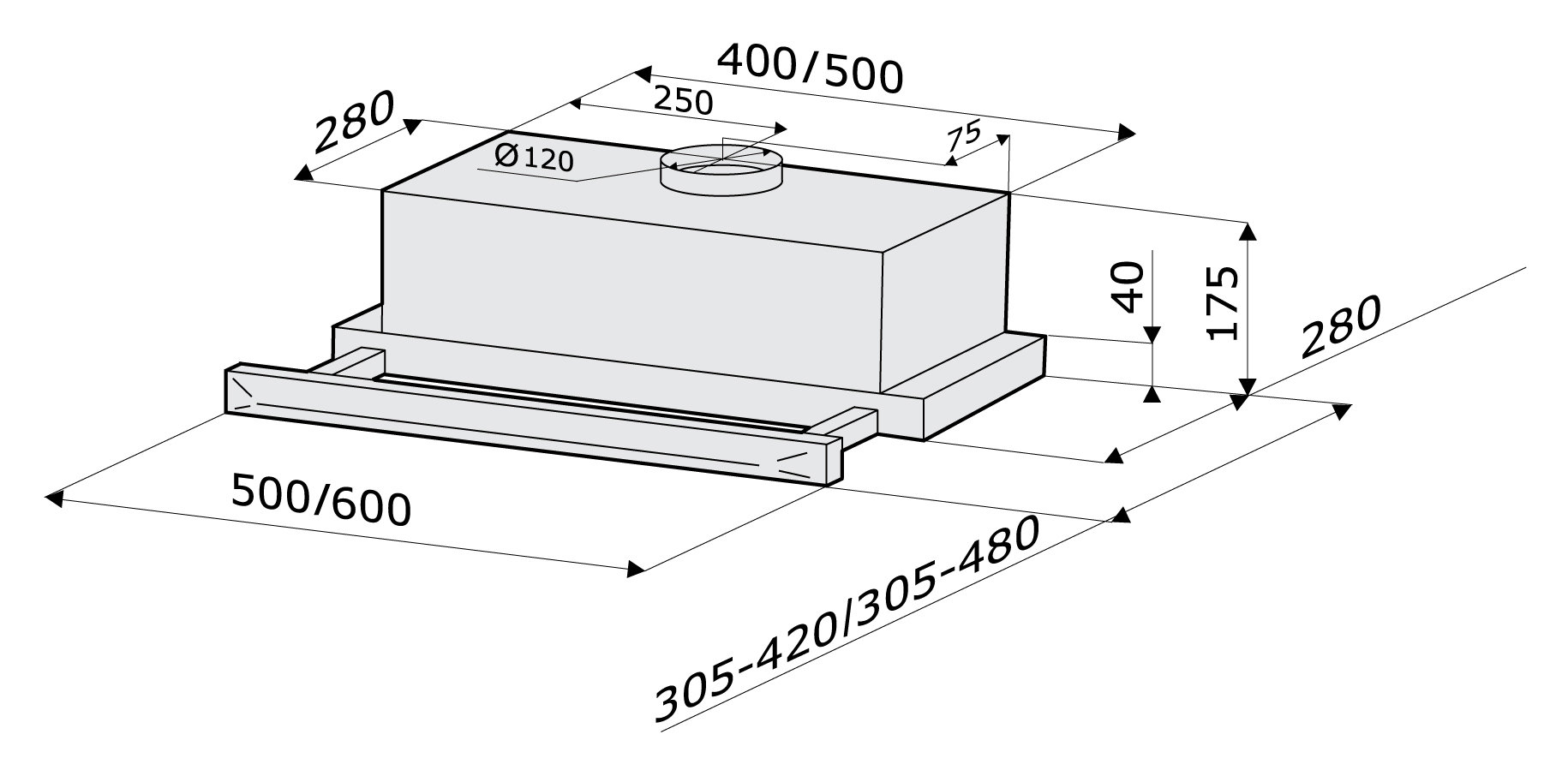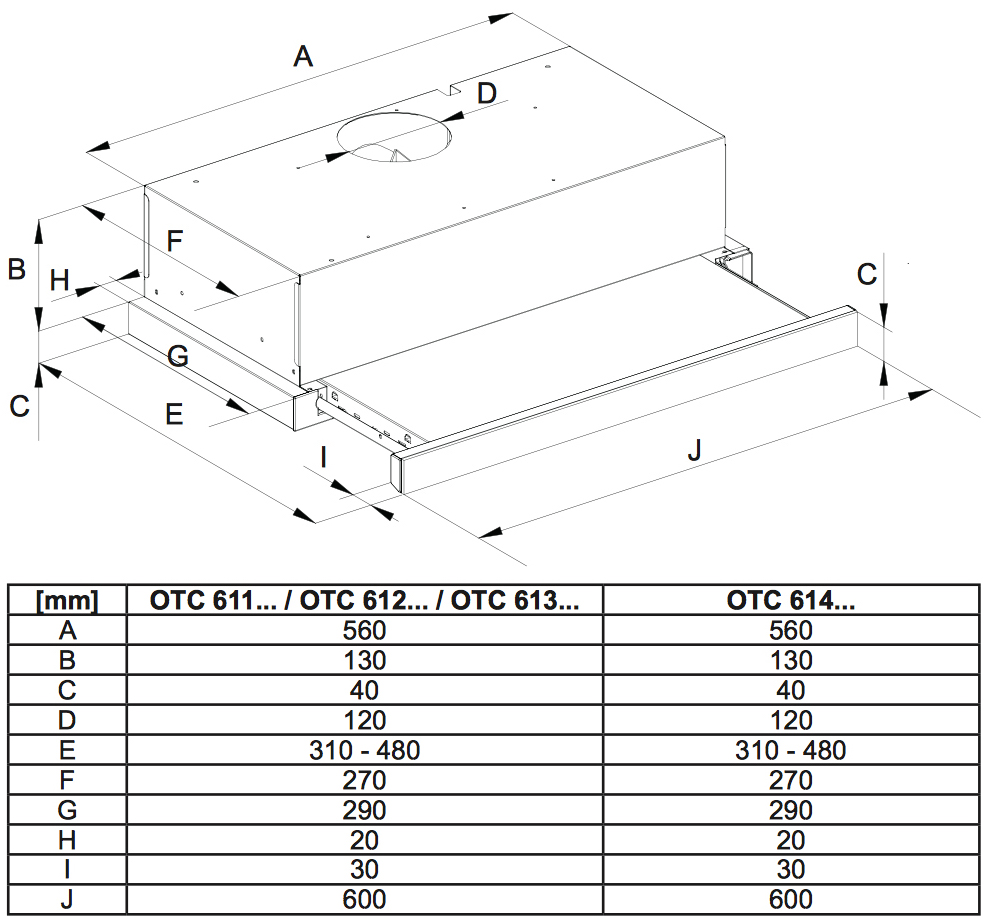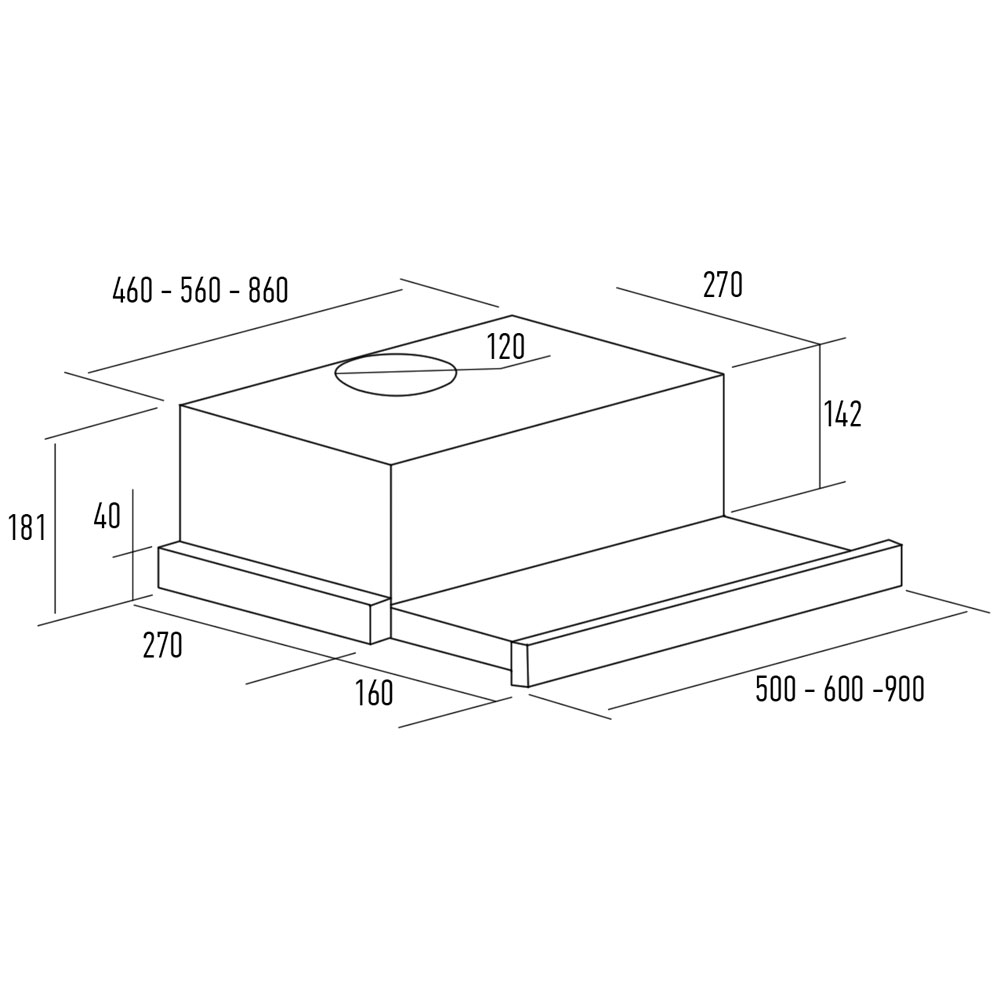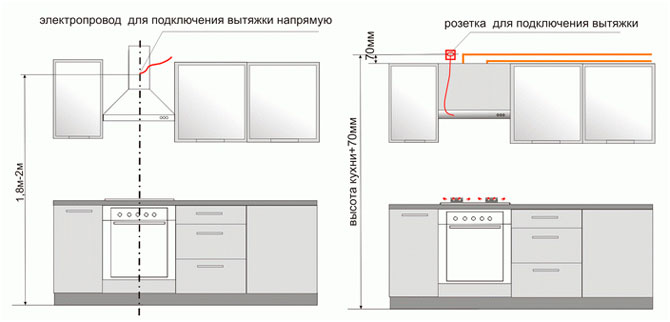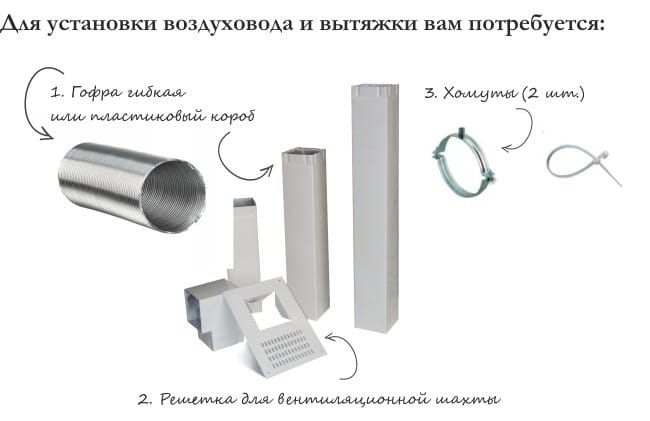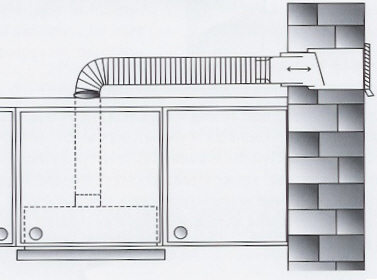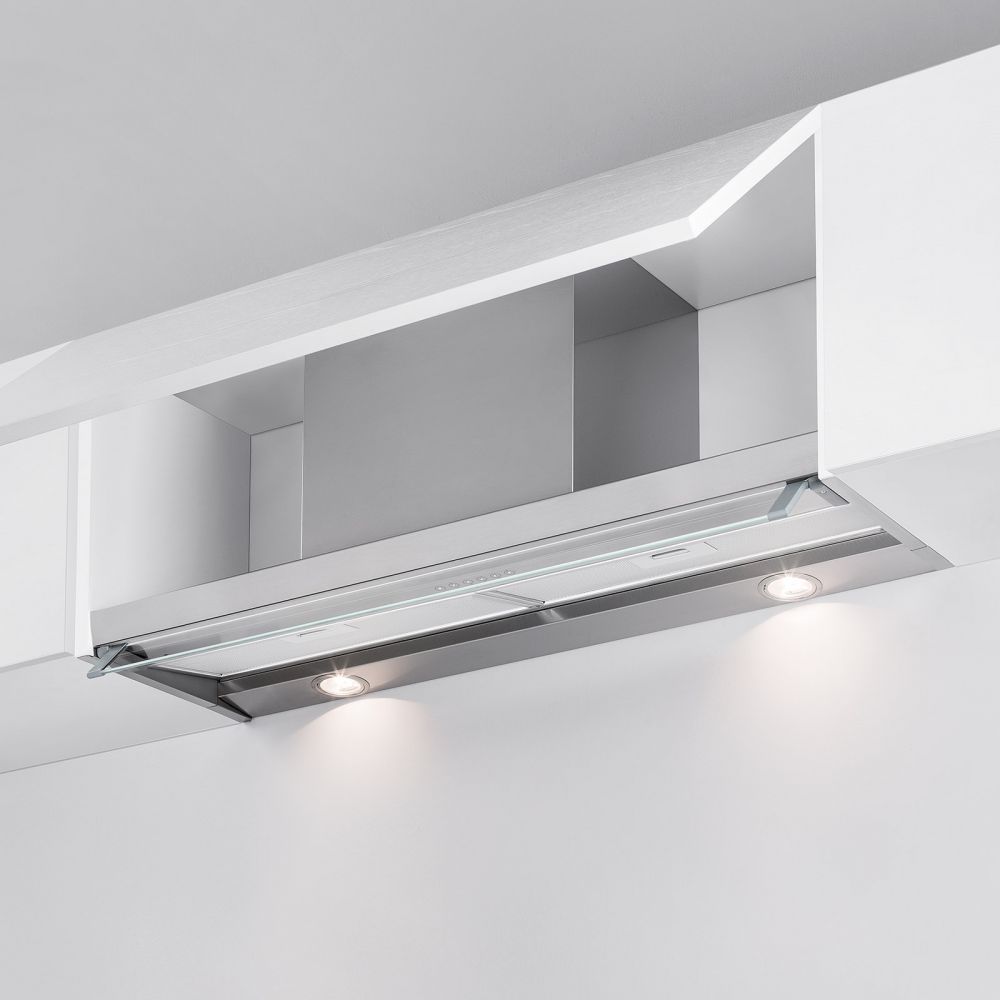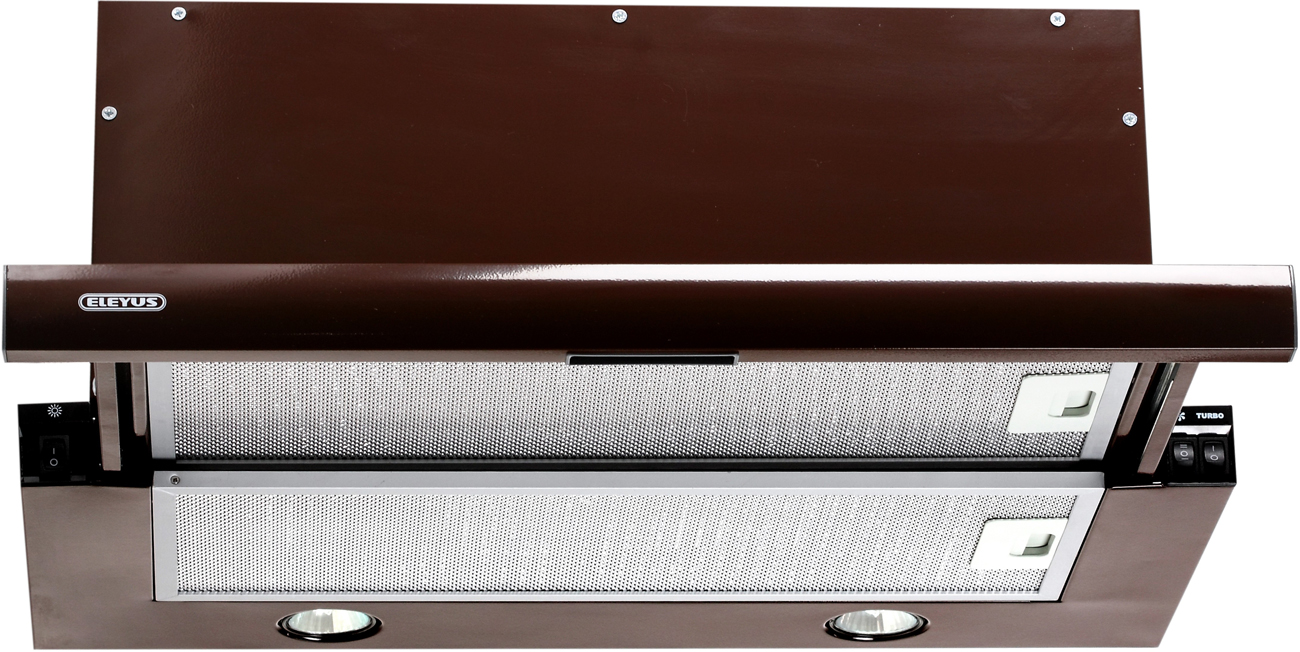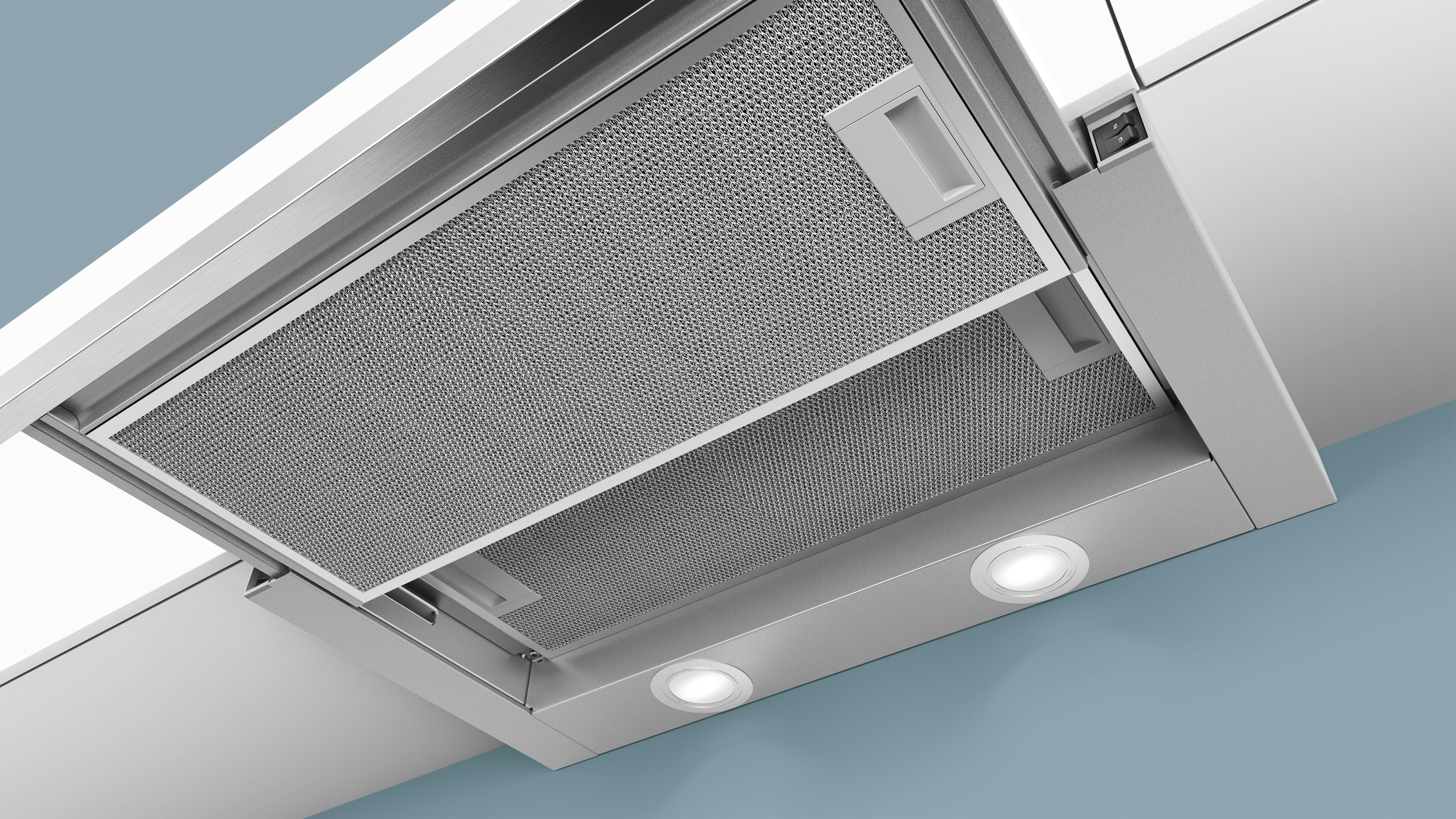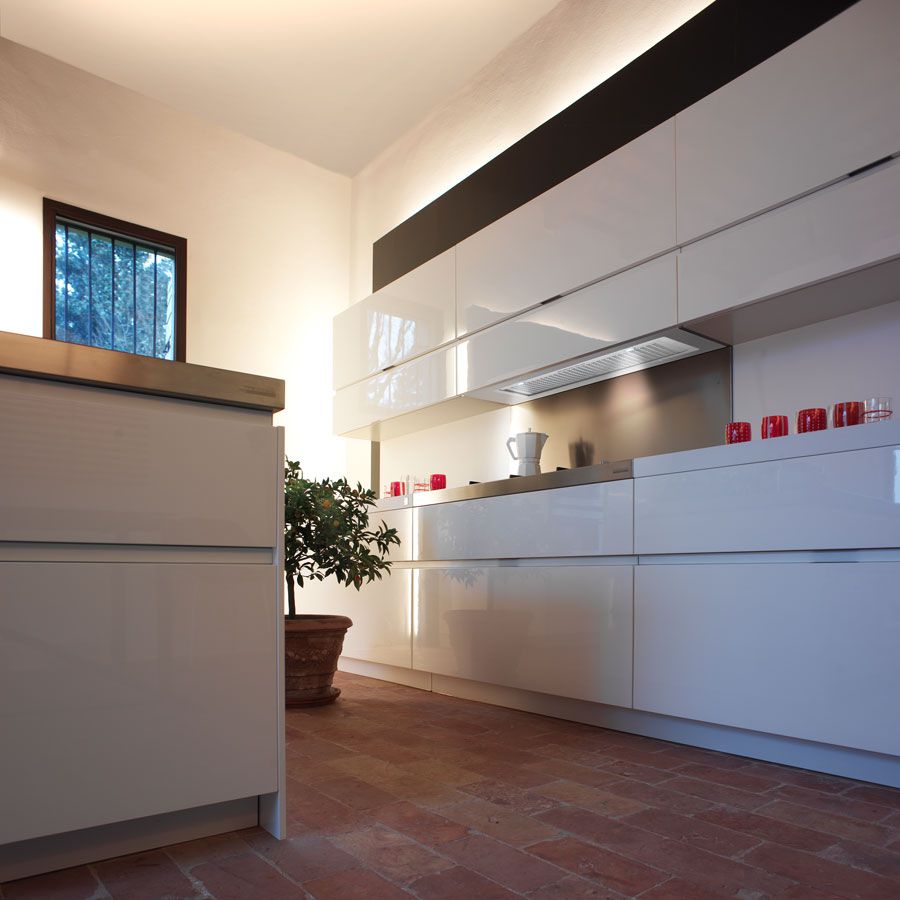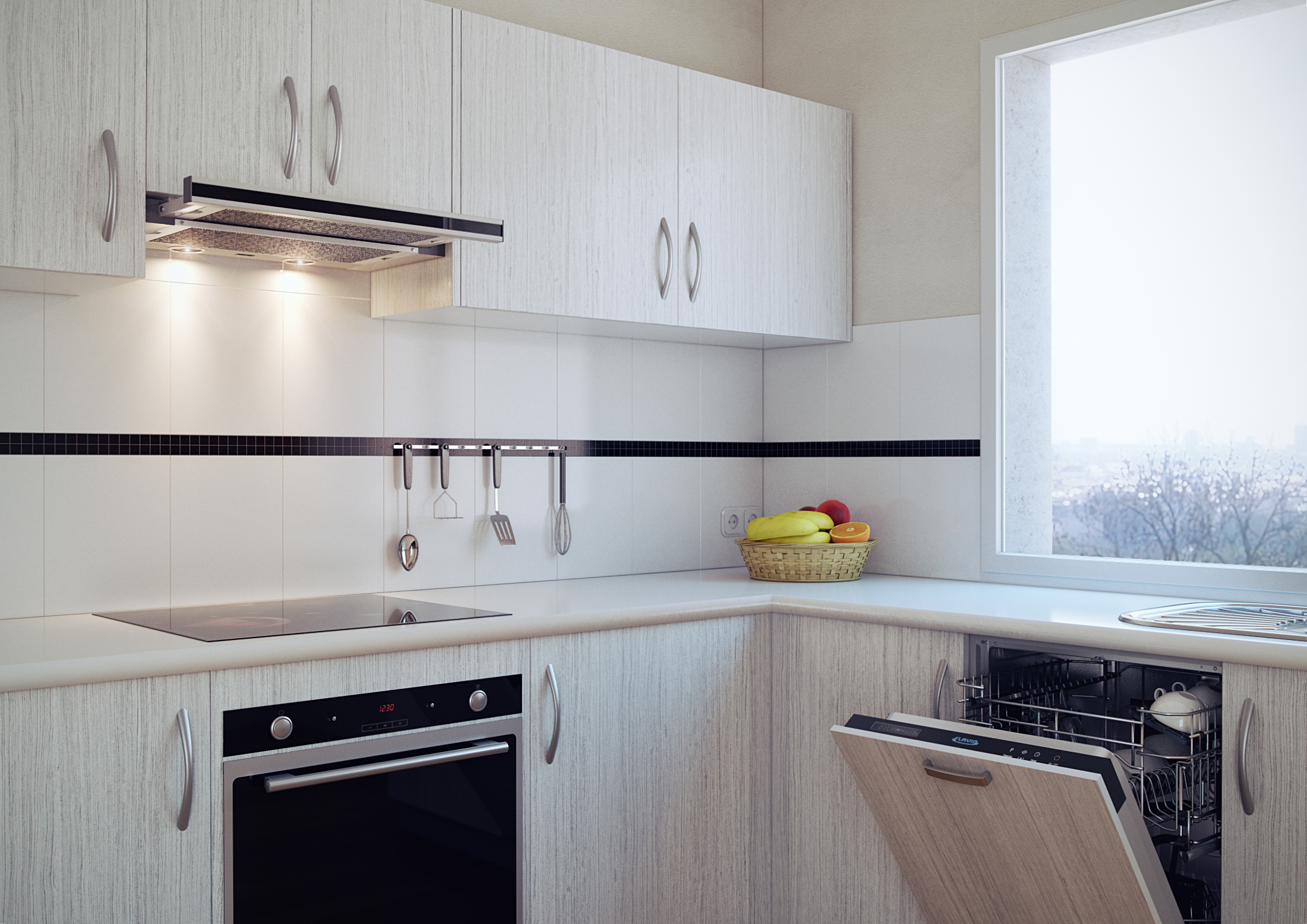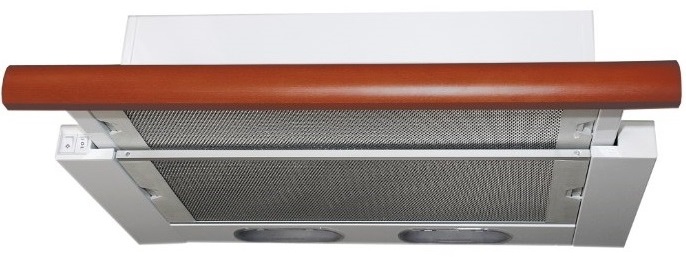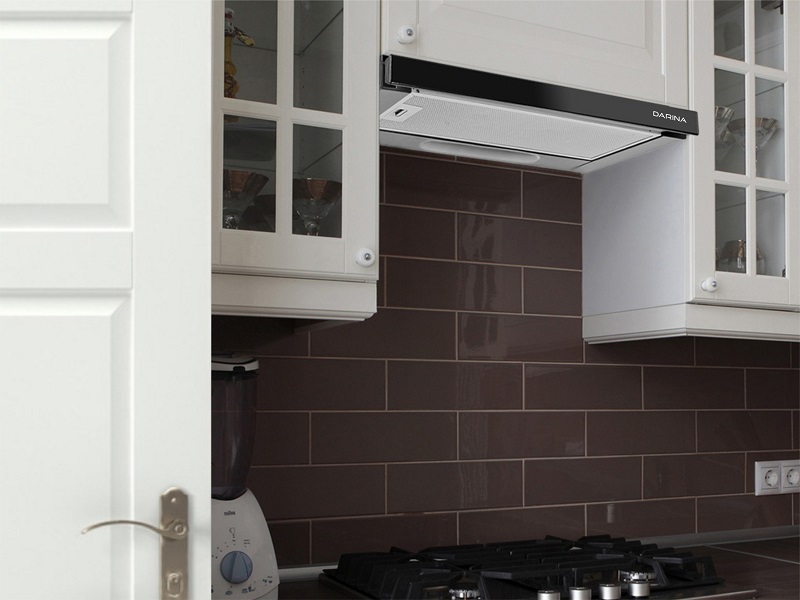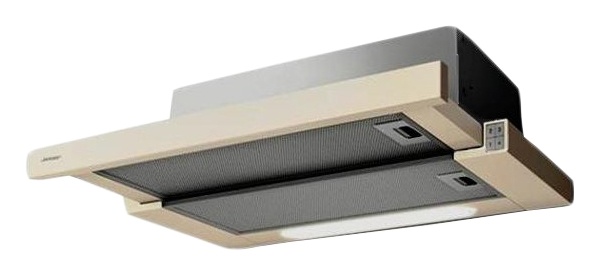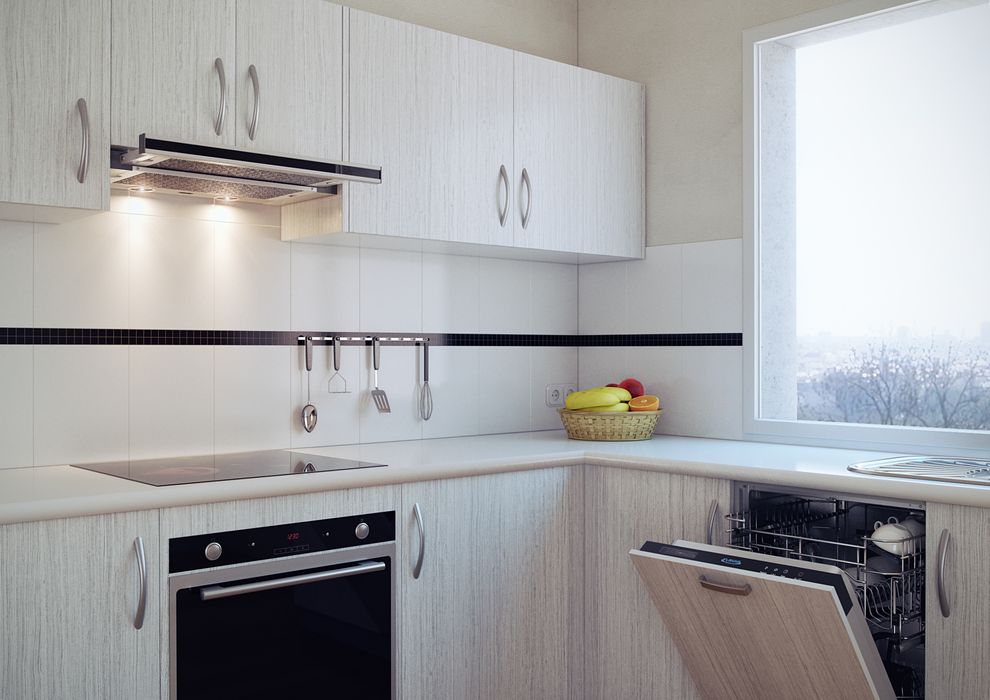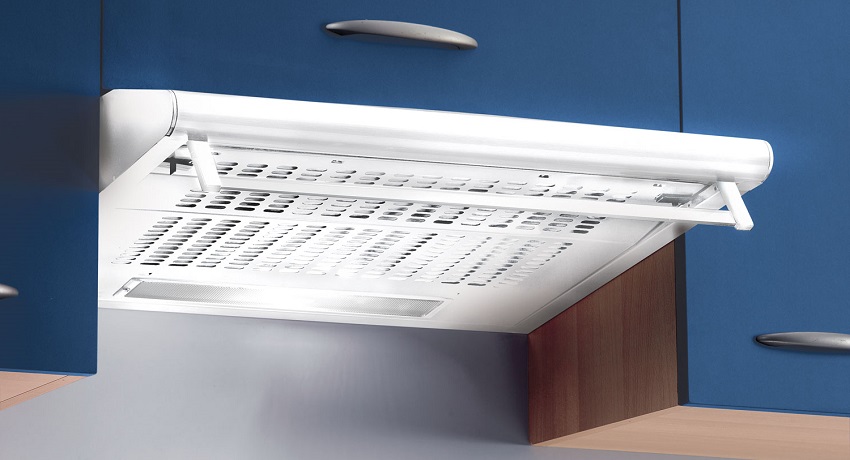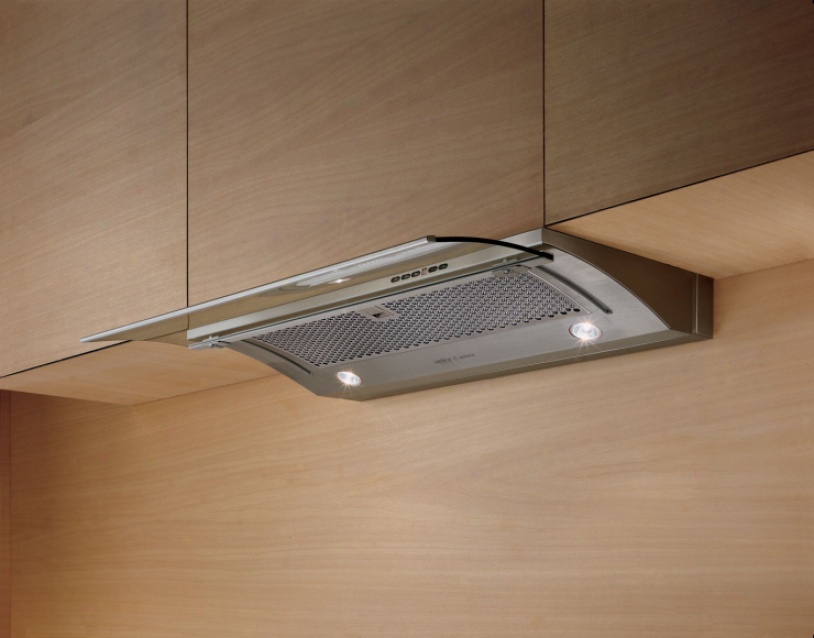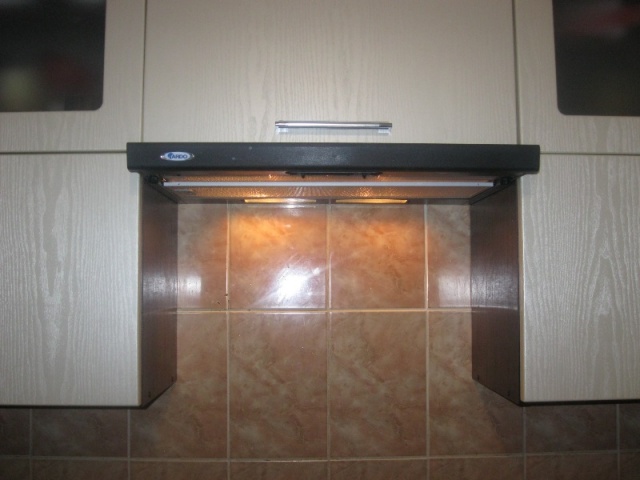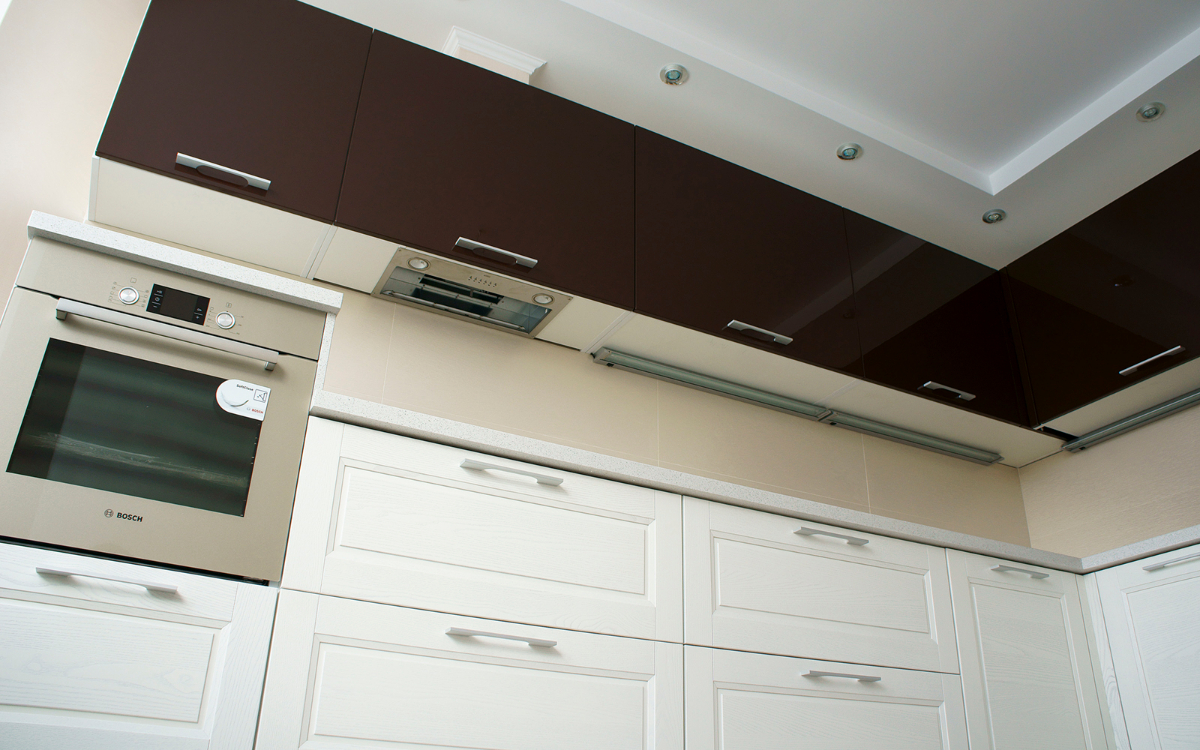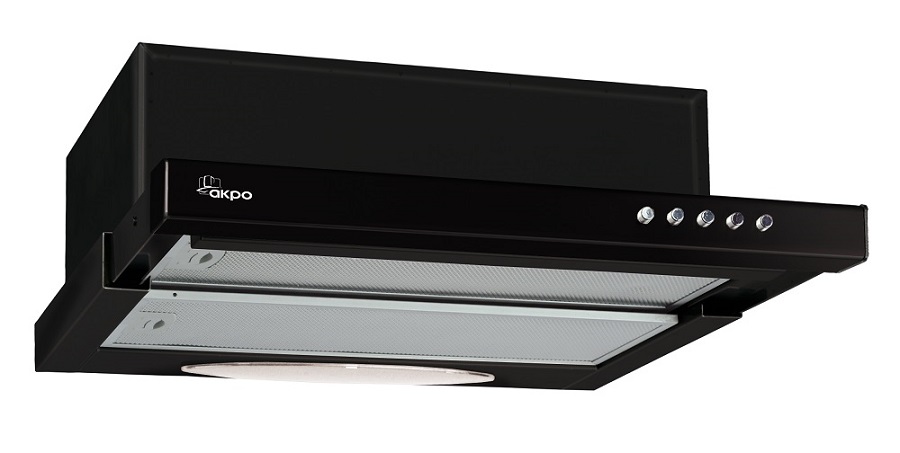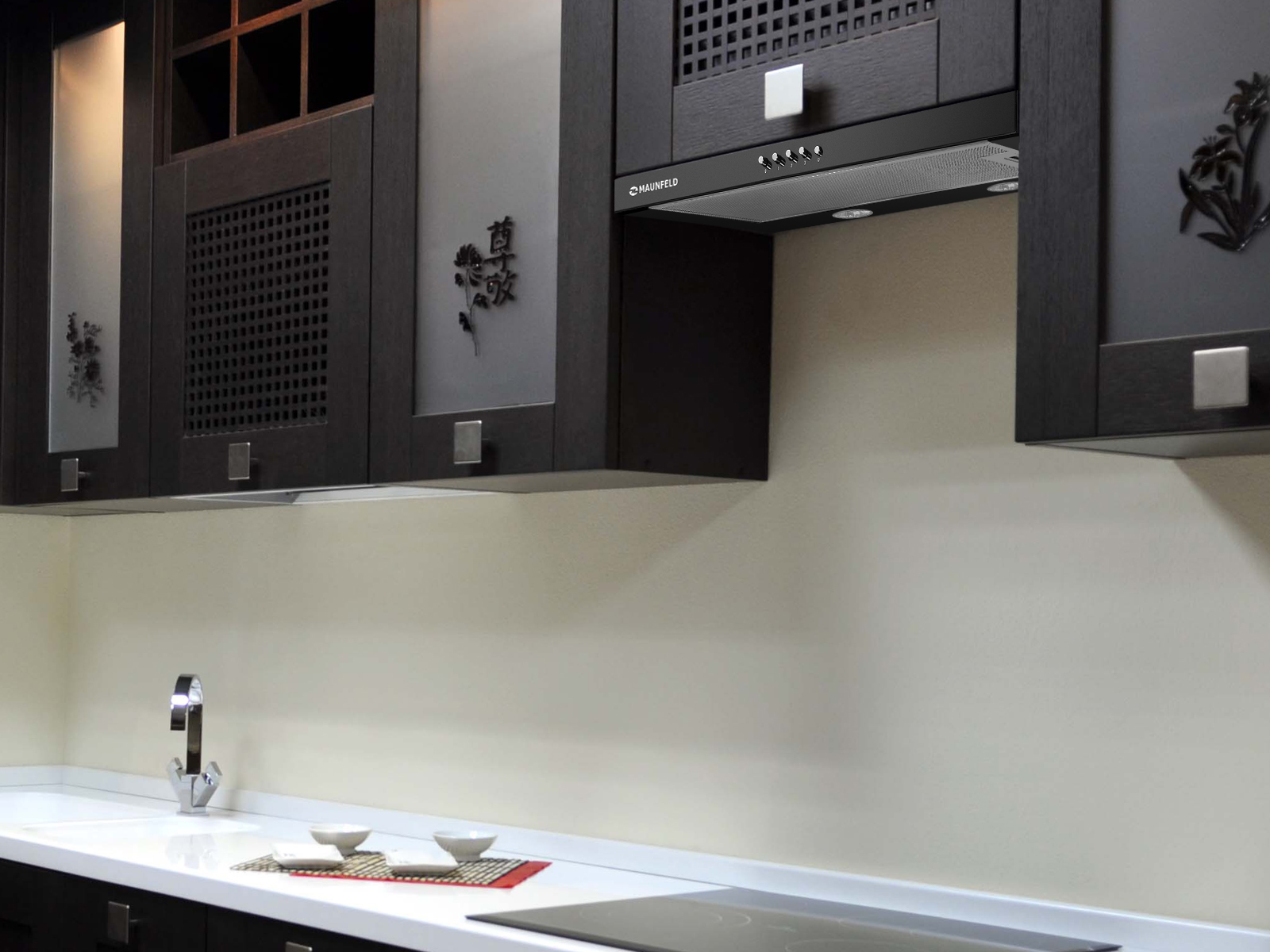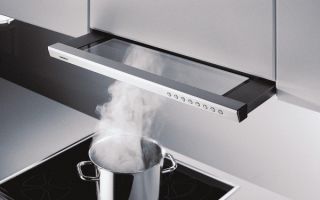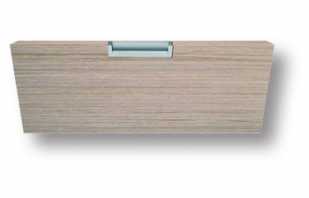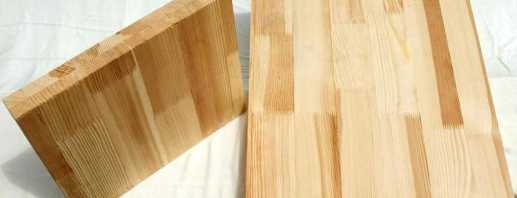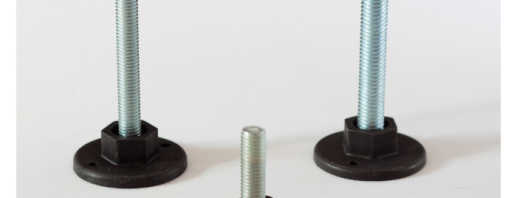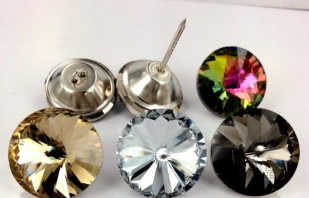Variants of the hood that are built into the cabinet, and their features
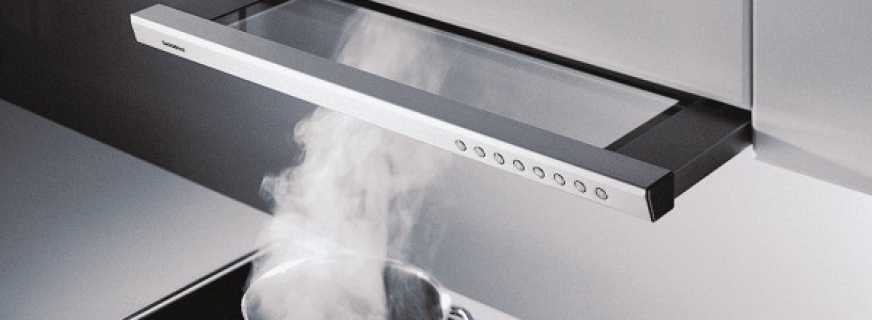
Convenience and comfort of cooking, being in the kitchen depends on many details. In this room, it is important to distribute everything so that the necessary is at hand. The comfort of your stay depends on such a thing as a range hood. Someone neglects it, believing that there is nothing wrong with kitchen smells: but so far it will only burn anything. Others would be happy to install such equipment, but do not want to take up unnecessary space without that cramped room. For this, there is such a solution as hoods built into the cabinet that do not take up much space and at the same time retain all the necessary functions.
Content
Advantages and disadvantages
There are different types of cooker hoods:
- dome;
- hanging;
- built-in (hood hood).
The most cumbersome of them is the dome, this option is definitely suitable only for large rooms. The built-in takes up the least space, while organically fits into the interior, making it stylish and modern.
Advantages of the built-in cabinet design:
- versatility that allows you to merge with the interior, become part of it, and also not catch the eye;
- compactness, small size, not taking up useful space;
- low electricity consumption;
- minimum noise produced;
- variety of variations and patterns;
- wide color gamut;
- ease of installation, installation, including DIY;
- good performance.
The built-in range hood is good in that it can be matched to any interior, placed in any, even the smallest, kitchen. This design has disadvantages, especially in comparison with other types of hoods:
- less power than the dome design;
- lower productivity;
- the need for regular replacement of the adsorbent filter;
- the need for regular cleaning of the grease filter.
But it is logical that a small built-in will be less powerful, productive than a dome. Productivity is the volume of air that the hood passes through itself over a certain period of time. Therefore, for a smaller area, an appliance with a smaller indicator is enough, which means that the built-in hood will be just right for a small kitchen. A variety of designs involves hoods as the minimum working area, and with the possibility of its expansion.
General characteristics
The hood of a fume hood is not only necessary for absorbing unpleasant odors - pleasant arising during cooking, too. After all, it is one thing when the aroma of food is only in the kitchen, another if it permeates the space of the entire apartment. In addition, the hood does not allow the smallest particles of fat, splashes of food formed during cooking, to scatter along the walls, cabinets.The hood draws them into itself, significantly facilitating the subsequent cleaning process.
Grease filters are installed in any range hood. They are removable, easy to clean and clean. This should be done regularly, because the performance of the device largely depends on the purity of such a filter.
The peculiarity of the built-in hood is that its device is hidden in a cabinet suspended above the stove. It can be either flowing or recirculating. The principle of operation of the first variety is that the polluted air is discharged by means of a discharge into the ventilation shaft or, in the absence of it, directly to the street through an additional hole in the wall. Fans for a fume hood are used to move air.
Recirculation does not require a ventilation shaft. The principle of operation of this system is to clean the polluted air and return it to the apartment. For this, the hood is equipped with special filters, most often carbon filters. They purify the air, trap dirt particles in themselves, and neutralize odors. The quality of the hood operation depends on their parameters. In addition, filters must be periodically changed - once every six months.The exhaust air is drawn in from below through a grease filter, on which the bulk of food particles, fats, and dust settle. Then it passes through a system of carbon filters and, cleaned, comes back.
According to the type of design, an integrated hood can be:
- fully integrated;
- with pull-out panel;
- visor.
The first type fits completely in a fume hood. Therefore, the working surface of the hood is equal to the area of its bottom, which, as a rule, is less than the area of the plate. For greater hood performance, it is necessary that these two indicators coincide. Therefore, visor models with a sliding panel also have greater performance. Visors include an internal device hidden in a cabinet under the hood, and a surface hanging over the stove.
The most convenient is the retractable model. In the off state, it is compact, almost invisible to the eye. To turn on, you need to slide out the panel located above the stove. It can be equal to the area of the plate, and maybe more.
By type of control there are push-button or touch models. The latter are more modern, easy to manage. You can turn it on, off, and adjust its operation with the slightest touch, for example, with the edge of your palm. This is important because hands are often dirty during cooking. But such a system requires more careful care. On the touch panel, even fingerprints are visible, and it is easier to disable it than a button. If we talk about standard features, then they can be seen in the table.
| Standard size grid | 50x60x90 centimeters. |
| Fan power (performance) | For a small apartment, at least 210 cubic meters per hour will be required. |
| Type of filter used |
|
| Noise level | A noise level of up to 50 dB is considered comfortable. |
| Additional functions |
|
Sizing
The larger the hood of the hood, the higher its productivity, respectively, the more air it can clean. When choosing the size of the hood, it is necessary to take into account the area of the kitchen, the larger it is - the more powerful, the design should be larger.
In small rooms, as a rule, an exhaust hood is sufficient, which coincides in area with the size of the stove. Usually this size is 60 cm. In general, the parameters of the hoods range from 45 cm to 90 cm.
The smallest, 45-50 centimeters are the least productive. Powerful 90 cm, as a rule, are equipped with a sliding panel and cover the maximum working space of the kitchen. Such hoods require more space for location, but provide maximum protection against splashes of food, grease, dust, kitchen odors.
However, usually the dimensions of the hood coincide with the dimensions of the plate. Kitchen cabinets are made the same size. The kitchen cabinet, located above the stove, is 60 cm long and leaves free space for the subsequent arrangement of the hood.The choice of size also depends on whether the kitchen is already equipped or planned from scratch.When a stove and a kitchen set are installed, in any case you have to adjust the hood of the hood to the available dimensions. That is, install it in a 60 cm cabinet.
When planning a kitchen from scratch, you can pre-calculate all the sizes of furniture, household appliances, including hoods. In this case, they can be absolutely any - at least 80 cm, at least 50. The main principle that should be followed: the ideal size is when the exhaust surface in area covers the surface of the cooking surface, and not vice versa.
Installation Rules
When ordering a finished kitchen, including a hood, it is easier to order a professional installation. When buying separately hoods, companies also offer installation. Installation can be carried out independently, but this is not about a laboratory fume hood with a sink, but about small household appliances. The design is installed in a hinged cabinet for hoods 60 cm without a bottom, located above the stove.
Installation must take into account safety requirements. The exhaust surface must be at least 70 cm above the electric stove, and at least 80 cm above the gas stove. If you neglect this rule, then, firstly, the hood may interfere with cooking. Secondly, the equipment will overheat, it may fail and even a fire.
Any hood is supplied with detailed installation instructions. But having no experience in such matters, for the first time it is better to entrust the installation to a specialist.
When installing the hood of a fume hood with your own hands, you need to follow these rules:
- nothing should interfere with the drawer. It should be in sight, easily extendable and retractable;
- if the hood is flowing, care must be taken to ensure that there is a ventilation hole nearby. The equipment outlet is connected to it;
- the connection of the outlet and ventilation openings must be reliable and durable;
- the distance between the stove and the hood should be 70-80 cm;
- an anti-return valve is required so that polluted air does not flow out;
- the cabinet above the hood should hide the structure itself, leaving only the exhaust surface outside.
It is important to make sure that there is an electrical outlet for connection next to the location of the hood. It should be nearby, but so that the wires do not hang too close to the surface of the plate. Also, the outlet should not be near the sink.
Operational Features
The operating rules of both a fully integrated and a visor, retractable hood are not much different from the use of any other household appliances. It is important to avoid overheating of the equipment (for this it is correct to install it), water ingress, wipe off dust and other contaminants in time, do not drop, hit, avoid twisting of the wire or its contact with hot surfaces.
Regarding the hood, which is built into the cabinet, the following rules should also be observed:
- the grease filter protects the internal system of the structure, retaining droplets of fat and splashes of the cooking food. The exhaust performance depends on its purity. Therefore, it is necessary to regularly remove it and rinse with detergent as it gets dirty. It is easily removed and put back;
- The carbon filter of the recirculation hood is one of its most important elements. Over time, he loses his cleansing ability. Therefore, it is necessary to replace it with a new one at least once every six months. There are carbon filters of different brands;
- care must be taken that the slide-out panel is easily extendable and retractable. For this, it also needs to be regularly cleaned of dust, dirt and particles of fat;
- If the hood is touch-controlled, the kitchen is particularly susceptible to contamination. Fingerprints, splashes of food remain on it, dust adheres to all this. The ease of use of the device depends on its cleanliness, and a strong degree of contamination can lead to breakage. Therefore, it is necessary to carefully monitor the cleanliness of the touch panel by wiping it with special wet wipes;
- The push-button control system can also suffer from particles of grease and cooking fumes. Clogging between the buttons, dirt can degrade their performance. Therefore, the cleanliness of the control panel must be monitored as carefully as the grease filter.
If the equipment breaks down or if its performance deteriorates, it is necessary to contact a service center. Timely handling can save equipment and extend its service life.
Manufacturers
Built-in hoods are produced by most manufacturers of household kitchen appliances, so that the entire room can be completely furnished with equipment of one company. There are companies specializing in hoods.
Popular manufacturers of similar designs:
- Bosch - this company has a good range of products from affordable models to premium. The latest models are equipped with a touch control panel and automatic selection of the operating mode, indication of filters, an additional cleaning system. They are distinguished by their noiselessness;
- Krona - This company specializes in built-in appliances for the kitchen. Their hoods comply with all modern requirements put forward by consumers. Hood sizes vary from 45 to 80 cm. There are both ultra-modern models and simpler ones;
- Elikor - the products of a popular Russian manufacturer meet all international requirements and standards. Elikor hoods are available not only in various colors, but also with decorative ornaments in the form of gilding and carving. A distinctive feature of this product is its unusual design (see photo);
- Hephaestus - hoods from this company are easy to operate, equipped with high-quality lighting. Their power and performance make the equipment suitable for both small and large rooms.
Whatever brand is chosen, for each of them the assortment line is full of a variety of models of hoods, from the most compact, allowing you to integrate them into a cabinet of 50 cm, up to 80 cm. And also in various color and style solutions. Built-in hood for the kitchen - a universal solution for any room where culinary masterpieces are prepared. By installing it, you can forget about unpleasant odors, freshen the air and noticeably facilitate cleaning.
Video


